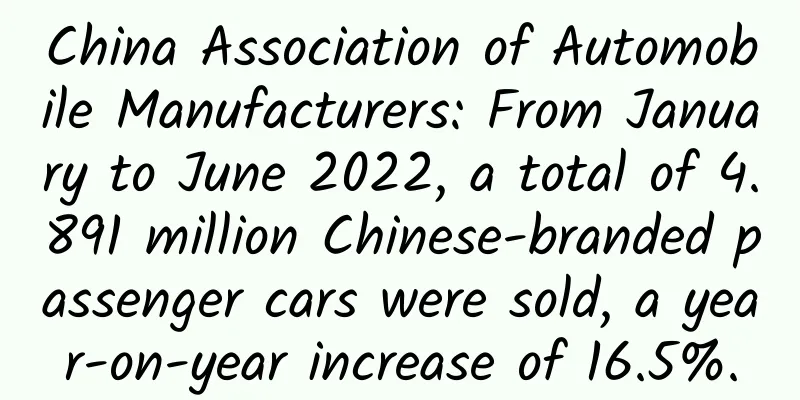China Association of Automobile Manufacturers: From January to June 2022, a total of 4.891 million Chinese-branded passenger cars were sold, a year-on-year increase of 16.5%.

|
It took only two years for Chinese auto brands to recover their market share from the bottom to the peak. As the market share of German and Japanese brands of passenger cars declined, the market share of Chinese auto brands increased rapidly and further approached the 50% red line.
According to data released by the China Association of Automobile Manufacturers, Chinese brand passenger cars sold a total of 4.891 million units from January to June, a year-on-year increase of 16.5%, much higher than the overall increase of 3.4% in the passenger car market, which also made Chinese brands account for a new high of 47.2% of the total passenger car sales. Among them, a total of 994,000 units were sold in June, accounting for 44.8% of the total passenger car sales. Two years ago (June 2020), the market share of Chinese brand cars fell to the lowest level since 2009 - only 33.5%. In the past two years, the automobile market has faced multiple challenges such as shutdowns, global chip shortages, rising raw material prices, and tight supply chains. In such a complex environment, it is particularly difficult for Chinese brands to achieve a substantial increase in market share. Chen Shihua, deputy secretary-general of the China Association of Automobile Manufacturers, analyzed that the expansion of the market share of Chinese-branded passenger cars benefited from three reasons: first, Chinese-branded passenger cars have comprehensively promoted brand upwardness, further narrowing the gap with foreign leading automobile companies; second, Chinese brands have advantages in the field of new energy vehicles. They have taken the lead by accelerating integration with intelligent networking, and have even surpassed joint venture brands in some technical fields; third, they have a precise grasp of the Chinese automobile consumer market and rely on the advantages of the local supply chain. Occupying nearly half of the overall market share, have Chinese auto brands really become proud of themselves? Leveraging new energy New energy vehicles have a significant driving effect on China's leading auto brands. With the continuous progress of the domestic automobile industry, more and more young consumer groups have a higher acceptance of domestic models. As "new things", electric and intelligent models are more popular among young consumer groups.
The Passenger Car Market Information Joint Committee's manufacturer retail sales ranking from January to June 2022 shows that among the top three automakers in sales, Chinese brands occupy two seats. After FAW-Volkswagen at the top of the list, there are Chinese brands BYD and Changan Automobile. It is worth noting that among the top 15 sales list, 12 automakers experienced a decline in sales, while BYD achieved a year-on-year increase of 168%, ranking second with sales of 638,500 vehicles. BYD has previously announced that it will stop the production of fuel vehicles from March 2022, and will focus on pure electric and plug-in hybrid vehicle business in the future. In the minutes of the investor meeting, it mentioned that the sales target for 2022 is conservatively estimated to be 1.5 million vehicles, and if the supply chain improves, it will hit 2 million vehicles. In addition, data released by BYD also showed that the total installed capacity of BYD's new energy vehicle power batteries and energy storage batteries in the first half of 2022 was approximately 34.04GWh, an increase of 167.90% over the same period last year.
Changan Automobile ranked third with sales of 558,700 vehicles. According to data released by Changan Automobile, new energy vehicles are also the market segment with the highest growth rate for Changan Automobile. Among them, the cumulative sales of self-owned brand new energy vehicles in the first half of the year were 84,958 vehicles, a year-on-year increase of 127.3%. It can be said that the rapid rise of the new energy vehicle market has driven the growth of sales of Chinese auto brands. Data shows that in 2021, China accounted for 52% of the world's new energy vehicle sales. As of May 2022, China's new energy vehicle sales accounted for a high of 59% of global sales, and the new energy vehicle market became the only market segment to achieve positive growth in the first half of 2022. Cui Dongshu, secretary general of the National Passenger Car Market Information Joint Conference, analyzed that, with oil prices soaring, more and more consumers are willing to choose new energy vehicles. At the same time, a large number of car buyers in the early stage are gradually entering the replacement cycle, and the potential demand in the new energy vehicle market is relatively strong. With the rapid growth of this market, the China Association of Automobile Manufacturers has also adjusted its forecast for domestic new energy vehicle sales in 2022 to 5.5 million units. Previously, the forecast was 5 million units. The year-on-year growth forecast has increased from 47% to more than 56%, an increase of more than 9 percentage points. One thing wins, the other loses In the past two years, the global automotive industry has faced severe challenges, including shutdowns caused by the COVID-19 pandemic, but also challenges brought about by global chip shortages, rising raw material prices, and tight supply chains. In the first half of this year, the epidemic had an impact on major auto industry cities such as Shanghai and Changchun, which are also the bases of many of my country's leading joint ventures and foreign brands. Automakers including SAIC Volkswagen, SAIC General Motors, FAW-Volkswagen, FAW Toyota, and Tesla have successively experienced shutdowns. It is worth noting that in April this year, the market share of Chinese brands soared to a high of 57%. It was not until mid-to-late April that local vehicle manufacturers in Shanghai, Jilin, Changchun and other places resumed work and production; from May, the production and sales of joint venture automakers began to rebound. With the resumption of production of leading joint venture brands, the market share of domestic brands has gradually declined. However, for auto brands that have experienced shutdowns, the impact of the epidemic in the first half of the year is still very obvious. According to data from the National Passenger Car Market Information Joint Conference, although FAW-Volkswagen ranked first in sales in the first half of the year with sales of 863,100 vehicles, it fell by 15.9% year-on-year; SAIC Volkswagen's sales in the first half of the year were 533,000 vehicles, and its ranking has slipped to fourth, a drop of 27.3%; SAIC GM's sales were 468,200 vehicles, a drop of 33.1%. This has given Chinese brands a chance to overtake to a certain extent. At the same time, the chip shortage has also hit the global automotive industry hard. According to the latest data from AutoForecastSolutions (AFS), an automotive industry data forecasting company, as of June 12, the global automotive market has reduced production by about 2.2304 million vehicles this year due to chip shortages. AFS also predicts that the global automotive market will reduce production by about 3.04 million vehicles this year. From a regional perspective, so far this year, China's cumulative production reduction due to chip shortages has reached 107,300 vehicles. Overall, the cumulative production reduction in China's automobile market is not large, and the growth rate of production reduction is slow. Europe and North America are still the two regions in the world with the largest cumulative automobile production reductions due to chip shortages, and this year's production reductions are expected to exceed one million vehicles. "The global shortage of chips and resources has led to a reduction in automobile production in Europe, the United States, Japan and other countries." Cui Dongshu believes that in the context of the global shortage of cars, Chinese auto brands have also ushered in an export opportunity. "Market demand in Southeast Asia and other places remains strong. The product strength of China's auto industry has greatly increased in recent years, which has directly driven the growth of export data." Cui Dongshu said. The China Association of Automobile Manufacturers said that in recent years, with the continuous improvement of the comprehensive competitiveness of my country's automobile products, Chinese brands have gained more recognition in the international market. At the same time, enterprises have also actively seized opportunities and vigorously expanded the international market. In particular, new energy vehicles have become the current export highlight, and some enterprises have successfully entered the markets of developed countries and regions such as Europe. Data from the China Association of Automobile Manufacturers showed that from January to June, my country's automobile companies exported 1.218 million vehicles, a year-on-year increase of 47.1%. Faced with the impact of uncertain factors such as chip shortages and the epidemic, joint venture brands are under greater pressure, which also makes Chinese brands perform better in the half-year sales list. However, joint venture brands are also accelerating their electrification transformation. With the gradual easing of chip shortages and the control of the epidemic, joint venture brands are also preparing to counterattack and regain lost market share. Although French and Korean car brands are gradually declining, the original market has been occupied by Chinese car brands. However, German and Japanese brands, which have a relatively stable foundation and reputation, still have strong competitiveness. With the first opportunity in the new energy field and the young consumer group's love for "national trends", it is still too early to say whether Chinese car brands can hold on to the market, or even continue to advance rapidly and break through the 50% market share "red line" in one fell swoop. From China Newsweek |
Recommend
Apple's ugliest designs this year: The new MacBook tops the list
There is no doubt that Apple's industrial desi...
How to rename an unnamed WeChat applet?
Q: How to rename an unnamed WeChat applet? A: How...
It is difficult to charge new energy vehicles, and charging pile operating companies are powerless. Who will break this vicious cycle?
In recent years, due to the use of ternary batter...
Mobike, a detailed explanation of user operation growth strategy based on the WeChat ecosystem!
How does an ordinary user use Mobike ? I thought ...
Want to buy an electric car with a range of 400km for less than 200,000 yuan? After the subsidy, you can consider this BYD
The trend of automobile electrification seems to ...
How are rental and living subsidies distributed to college graduates in Changsha? Attached application guide
How to apply for housing rental and living subsid...
One year after the stimulus policy was withdrawn, the overall home appliance industry is still sluggish
The overall downturn in the home appliance indust...
Apple Watch causes trouble: Many universities prohibit wearing watches during exams
[[127723]] Beijing time, February 9 morning news,...
The human body staged a palace drama that was even more exciting than the hit TV series!
Source: Youlai Healthy Life...
What are the benefits of mini programs for beauty and hairdressing? What is the best thing for WeChat mini-programs?
Q: What are the benefits of mini programs for bea...
Bilibili product analysis: Station B’s path to change
The multiple historical highs created by Bilibili...
Detailed explanation of the new business model of customer acquisition in 2020: the competition for stock, closed loop of traffic...
Advertising is a barometer of economic developmen...
That grill master may be a master of chemistry
Editor’s Note: Barbecue is nature's gift to m...
Internet TV: Industry observations after interviewing license holders
According to Streaming Media Network: On July 11 ...
Efficient iOS Programming - Keep doing good things and turn them into habits
[[146148]] Habits affect the way a person does th...









